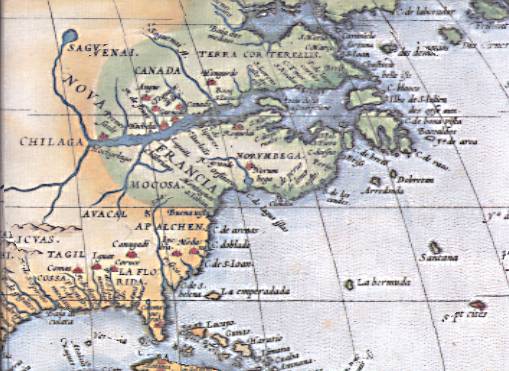The place name, Norumbega, began showing up on maps of North America in the 16th Century, indicating, variously, the region now known as New England, the river in Maine now known as the Penobscot, and settlements on that river believed to be in the area of present-day Bangor. Some very early maps offer an alternative spelling of "Orombega;" Verrazzano spelled it "Oranbega".
The origin of the word is uncertain, though most scholars believe it to be derived from AmerIndian, especially Algonquin, use; some suggest it is a European corruption of the Abnaki name of the area near Bangor. It was widely used until shortly after the turn of the 17th Century, following John Smith's mapping of the eastern seaboard and naming the northeastern area for his home country. It is said that when the heir apparent to the throne, Charles Stuart, examined Smith's map, he decreed that Smith's names – Cape Elizabeth, Cape Anne, the Charles River, New England, etc. – replace the "barbarous" place names based on AmerIndian tongues.
It was David Ingram, a crewman aboard the ship owned by English slaver, Sir John Hawkins, who deserves credit for mythologizing Norumbega. He had been a crewman aboard a slave ship which had been wrecked along the coast of the Gulf of Mexico in 1562. Ingram claims to have walked northward to Nova Scotia, where he was picked up by a French ship and given passage back to Europe. Once home, he earned supper and cups of beer by regaling “his drinking companions with tales of Norumbega, up the Penobscot River, where people wore jewelry inset with thumb-sized pearls and lived in round houses held up by pillars of crystal, gold, and silver. There were, he said, red sheep and other fabulous beasts, among them one with floppy ears like a bloodhound (a moose?).”[1] His accounts eventually appeared in print, inspiring expeditions to the New World in search of the Eldorado-like City of Gold in eastern North America.
We should not be too quick to sneer at the gullibility of those 16th Century gold rushers. In many ways, their story is our own. We, too, are beguiled daily by the glimmer of baubles of one sort or another – material possessions, social status, entertainment – to the point that we miss the ground that is right under our feet and the miracle of Life that is all around us.
This matter of learning to see is admittedly tricky, considering the extent of cultural conditioning we've been undergoing since birth. Nonetheless, learning to be keen observers of the physical world provides us with a base of training to be acute regarding the more difficult psycho-spiritual aspects of our being.
One could start anywhere in the physical world, but we here at the Almanac favor weather and astronomy, because, certain mitigating factors aside, they are universally available and free. Our observations will center most often, as one would expect, on weather which affects northern New England and on night skies which can be viewed from the Northern Hemisphere. And, because our lives are also affected by those "fellow mortals" – the flora and fauna – with whom we share this little patch of real estate – not to mention by the real estate itself – we will hone our observational skills on them as well.
At the same time, we'll also explore our own instruments, those personal "norumbegas" we find everywhere we go: our senses and spirit. Intensely intimate familiarity with these instruments begins with continual awareness of their presence and understanding of their processes, just as our observations of the physical world around us begin with mastering continual awareness of its presence and processes. We hope our readers from other parts of the world will be inspired to make their own observations of their particular circumstances.
The quest of this site is to find the “real” Norumbega in all its aspects.
Yours truly,
Colby Quid, editor
Notes
[1] From David Wallechinsky & Irving Wallace, "The People's Almanac," quoted by Trivia-Library.com . [back to text]


